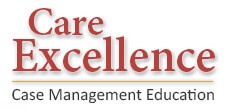Interpersonal Conflict is a Fact of Life
 Interpersonal conflict is even a healthy part of a relationship since two people can’t expect to agree on everything at all times. But, when conflict is mismanaged, it can easily destroy trust. As a case manager it’s important to develop and grow skills in conflict resolution that improve outcomes and reduce stress for you, your clients, and providers within your health system.
Interpersonal conflict is even a healthy part of a relationship since two people can’t expect to agree on everything at all times. But, when conflict is mismanaged, it can easily destroy trust. As a case manager it’s important to develop and grow skills in conflict resolution that improve outcomes and reduce stress for you, your clients, and providers within your health system.
There is an imbalance of knowledge and power that typically characterizes healthcare relationships between professionals and patients, often because the case manager and/or healthcare provider are viewed as “the experts.” This perceived inequality creates vulnerability in a relationship in which trust plays a key role, and trust is at least to some extent, a prerequisite to seeking care. Conflict may also grow between healthcare professionals when poor communication, disagreements, or perceived disrepect are allowed to fester.

When conflict is handled in a respectful and positive manner, it increases the opportunity for growth and ultimately strengthens the relationship between two people. When you can improve your conflict resolution skills it helps your healthcare organization, and the groups in which you participate, to work more effectively.
It’s important to remember that dealing with conflict early in a situation usually makes resolution easier, since positions don’t become entrenched and negative emotions are not extreme. Undertaking the following strategies will depend on your ability to manage stress, control your emotions, and pay attention to the feelings being expressed by the other individual.
Get to the Root of the Problem
The more information you have about what triggered the conflict, the more easily you can resolve it. That sounds a little simplistic, but too often a resolution is attempted without having all of the information you need. Even if you are part of the conflict, it’s important to identify not only your feelings, but also what triggered the disagreement in the other individual.
Look Beyond the Moment
Often disagreements are not triggered by what happened in the immediate setting, but rather baggage one person brought with them into the conversation. As a case manager, it’s important to see both sides of the story as it gives you a better understanding of the situation and helps you to demonstrate impartiality, even when you may be one of the individuals in the argument!
This essentially helps you to hone your listening skills, paying attention to not only what’s happening in the moment but also to what has happened in the past. It’s vital to understand what perspective the conflict has originated from, so the other person feels heard and understood and you’re more likely to come to a successful resolution.
Seek Out Solutions from Each Perspective
After getting each viewpoint in the conflict, it’s important for each person to also identify how a situation might be resolved. Soliciting ideas from both parties helps ensure that both feel they’ve been understood and heard. Often, this is all that’s needed to resolve the conflict as both parties are ready to compromise if they feel as if their side of the story is understood.
It’s also important to use active listening skills during this part of the resolution as it helps you to become a better listener and demonstrates your desire to find a resolution.

You must also recognize what triggered this episode of conflict so that it may be avoided the next time. Requesting solutions indicates a willingness in both parties to compromise, leading to a plan to address those differences and find a successful resolution.
Watch Your Language
Anytime there are disagreements it’s important to use “I” statements. By framing thoughts around yourself, it avoids placing blame on others or focusing on the emotions or reactions that led to the conflict in the first place. Statement such as “you don’t include me in decisions that impact my patient’s healthcare” may be resolved more quickly when reframed to say “I find it difficult to do the best job possible when I’m not aware of decisions that impact my clients.”
Although it may be your instinct to fill in the silence when there’s a gap in the conversation, it’s important to allow individuals having a difficult conversation to reflect and consider their responses. Allowing time can be difficult when silence feels awkward or when a topic doesn’t have an easy answer.
Negotiate a Win-Win Compromise
Once there are solutions on the table, it’s time to negotiate a compromise that ends in a win-win for both parties. Anytime one person feels they’ve given more than the other, it can trigger another conflict down the road. In some cases, this may not be feasible as one individual may be more entrenched and hold more power.
However, by pointing out the merits from each perspective, it helps individuals identify solutions they can support. This may be as simple as identifying a stress word your client can use when they feel as if they’re starting to lose it. This allows them the dignity of stepping back from a conversation and getting themselves together.
Know When to Let it Go
Sometimes, regardless of your efforts or skill, there are situations where resolution will not be found. In that case, it’s important to know when to walk away from the table and acknowledge you may never see eye-to-eye on the topic.
If the situation has gotten too difficult to resolve, or you feel both you and your client or healthcare provider have gotten entrenched in your positions, it may be time to bring in a mediator if the situation requires conflict resolution in order to continue providing quality care.
SOURCES
Conflict Resolution Skills. Edmonds Community College
An Introduction to Conflict Resolution. Skills You Need
Cornett, I., (May 16, 2018) The Top 5 Skills Needed to Successfully Resolve Conflict in the Workplace. Eagles Flight
Goold, S.D., (2002) Trust, Distrust and Trustworthiness, Journal of General Internal Medicine 17(1):79
